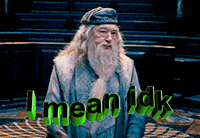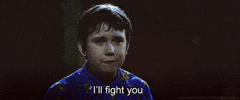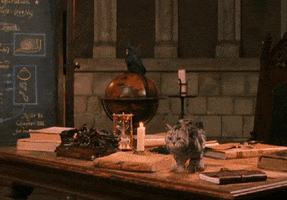Growing up, Harry Potter was the one fandom that I felt normal in. I always felt as if there was something magical about me, or maybe I just wanted there to be. Either way, my being different and not understanding, what I deemed to be, others incompetence, lead me to feel alone and under-appreciated. Often times as a kid I would stare at a clock and attempt to make time stop. I would make bets with myself in my mind that if proven to be true would mean that I was a wizard. Disclaimer: I do not and will not ever support the author who's name is on the cover of the Harry Potter books. She is a Terf and transphobia and if you want ways of enjoying Harry Potter without supporting such a human, reach out and I will give the ways that I engage in currently.

(GIF is Albus Dumbledore moving his hands to his hips with the words "I mean idk" at the bottom bouncing at the bottom of the screen)
The purpose of this blog entry is not to just explain how much I wished that I was a magical-being rather than a muggle-born, but to explain that there is magic in being who we are as people. As a communication scholar, a lot of my magic is from my words and performative actions. The things that I say, do, and do not say can change the world and help others and myself gain new understanding for systems of injustice. "Words are, in my not so humble opinion, our most inexhaustible source of magic, capable of both influencing injury, and remedying it." This quote was said by the amazing Albus Dumbledore in Harry Potter: and the Deathly Hallows. The words that was use or do not use have power, and the ability to mend brokenness and create wounds are a terrible but great thing.
As a Teaching Assistant, I have found that my words do not just affect me, but my words also affect my peers, instructors, and my students. As someone that struggles with a communication disability (Autism Spectrum Disorder) I often find myself wondering if I should speak up on something or address certain issues because I am unsure if I will say the right thing. This is what I would describe as an internal struggle with my wizarding power. To speak or not to speak is that question.

When it comes to everyday life outside of the academy, I work as a manager at a local shop where I often come in contact with people who either have views that are oppressive and unjust or find the academy to be un-important. I might as well have cast a silencing charm on myself before I have even begun if I only allow them to speak in a domain in which we have the ability to speak from our positions. The words that we use and do not use matter. As it comes to political statement or identity politics, at work I wear LGBTQ+ pride attire. At some points the clothing that embodies acceptance for me as earned me pleasant conversations of relatively, and other times has garnered me looks and comments of disapproval. The key to using my muggle-born magic is to use my words or lack of words in a tactful way that suggests for other to engage with ideas and concepts that they may or may not align with.
Coming back to the academy, I have found that when students are vulnerable and disclose with me, I feel like I trust them more because they trust me more. Words are extremely important but standing up and using them when no one else wants to or can is something against the social construct and out of the "normal". In the Harry Potter movies, Albus Dumbledore was a wise older wizard and known as the headmaster of Hogwarts, but also he was know for not being able to stand up to his friend. At the end of Harry Potter: and The Sorcerer's Stone, Neville Longbottom was awarded 10 points for standing up to Ron, Hermione, and Harry when they were trying to leave the dormitory, which was against the rules. We are and have to be Neville in situations.

(GIF is Neville Longbottom with his hands up, swaying side-to-side with the words "I'll fight you" at the bottom go the image)
There is not always a direct confrontation that has to be made, however the note that is often overlooked is that staying quiet or sitting by as oppressive language is used can be just as damaging as using the language first hand. Furthermore, some individuals that stand by and allow racist, sexism, homophobic, etc. jokes to occur around them harbor ill feeling towards or even distain for individuals and even though they feel that discrimination is wrong, will allow acts of oppression to occur because of there prejudices. The Psychology Today article published on July 18, 2011, titled "Does Racist Humor Promote Racism? Research illuminates aspects of humor that people tend to ignore," asks the question, "does disparaging humor that targets these groups foster discriminatory acts against them?" The articles findings concluded that the answer was yes to the question purposed. The article dictates, "First, humor depends largely on the context and on the personality and the attitudes of the audience. Jokes are never neutral. The same joke can be funny or not, but can also be racist or not racist depending on who tells it and to whom," and "Second, humor is not always positive and fun. We tend to think about humor as something that is innocuous, something that might be good for our health, moods, relationships, and so on, but humor also has its dark side, and we should all be aware of it. Sometimes humor can lead to negative and harmful outcomes against others, and we should be conscious of when and how it can happen."

(GIF is Professor Minerva McGonagall leaps of the desk in her cat for and transform in the air to her human form to walk with a purpose)
It is important to stand up to micro aggressions and concepts that you do not agree with or see an issue with supporting. In our pursuit for the truth, it is important to engage with people on our journey. If we as scholars do not engage with people who are not scholar and whom have differing beliefs than our own, then we are not progressing society in understanding, but rather are only on a self-fulfilling journey. Use your muggle-born magical ability of words, make Dumbledore proud, and speak out against injustice to people that do not recognize it. #FuckTheNorm
Psychology Today Article: https://www.psychologytoday.com/us/blog/humor-sapiens/201107/does-racist-humor-promote-racism
Alyx, I experienced 18 years of micro-aggressions, differing beliefs of my own, disparaging humor against me (sometimes in front of others),and his humor was negative and harmful. I decided to major in communication studies because I wanted to learn how to communicate effectively. I am so glad we developed a relationship where we help support each other, #EnCourageEachOther to stay on task, and help each other understand assignments. I wish i was magic too lol. I would cast spells on mean hearted peopled to make them nice, then fly on a broom into the moonlight :)
ReplyDeleteHi Alyx,
ReplyDeleteI really latched on to one of the sentences in your post: "Coming back to the academy, I have found that when students are vulnerable and disclose with me, I feel like I trust them more because they trust me more."
I can absolutely connect with this idea, and I try to remind myself that it goes both ways. When I'm engaging with new peers or co-workers, offering a bit of my own vulnerability (or at least what is perceived as vulnerability) may make others feel as though they can trust me, both with their thoughts, and with their emotions. Sharing is caring is friendship, etc. etc.
I also see it as useful when standing up to injustice, as you (rightly) call out as a necessity. When I'm interaction with others who may not agree with me, providing an explanation that approaches them with some gentleness and offers some piece of myself often lands me in a position where I can hold a little more ground with them. Certainly, this is not appropriate in all situations, and if you're in a position where this vulnerability will be damaging to you or someone else, it is likely not in your best interest. But, in the spirit of fighting injustice and widening our toolbox to do so, I offer this as an option.